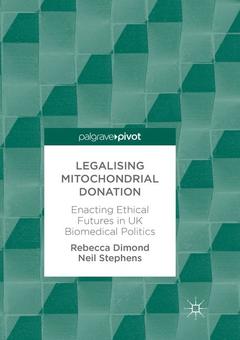Legalising Mitochondrial Donation, 1st ed. 2018 Enacting Ethical Futures in UK Biomedical Politics
Auteurs : Dimond Rebecca, Stephens Neil

Deals with an issue with great national and global relevance
Offers a distinctly sociological take on mitochondrial donation
Provides a unique insight into an important and ethically-challenging topic
Date de parution : 04-2018
Ouvrage de 147 p.
14.8x21 cm
Thèmes de Legalising Mitochondrial Donation :
Mots-clés :
reproductive technology; genetic technology; biopolitics; socio-legal studies; Mitochondrial donation; Science-religion; Boundary-work; Biomedical politics; Three-parent babies; Sociotechnical imaginaries; Enacting ethical futures; Bioethics; Nuffield Council on Bioethics; Human Fertilisation and Embryology Authority; Crispr/Cas9; Wellcome Trust Centre for Mitochondrial Research
